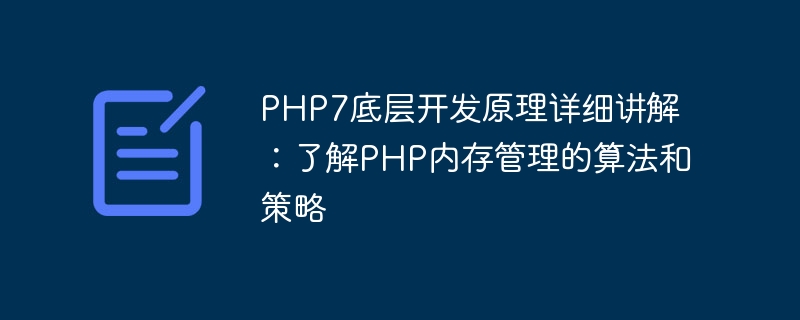

PHP is a very popular dynamic programming language that is widely used for web development. PHP7 has made a series of major improvements in underlying development, especially in memory management. This article will explain in detail the underlying development principles of PHP7, including understanding the algorithms and strategies of PHP memory management.
PHP7 introduces a new memory management system, whose performance and efficiency have been greatly improved compared with previous versions of PHP. The core of PHP7 memory management is to improve the running efficiency of the program by optimizing the allocation and release of memory. To understand the algorithms and strategies of PHP memory management, you need to understand the PHP memory model and related data structures.
First of all, PHP's memory model can be divided into two parts: heap and stack. The heap is an area used to dynamically allocate memory and stores dynamic variables and objects in PHP programs. The stack is used to store function call information, including function parameters and local variables.
In PHP7, a memory management algorithm called "reference counting" is adopted. This algorithm determines when to release the corresponding memory by tracking the number of references to each variable. When a variable is no longer referenced, its reference count is decremented by one. When the reference count reaches zero, its corresponding memory can be released. This process is automatic and implemented by PHP7's internal mechanisms.
However, the reference counting algorithm is not perfect. One situation it may occur is a circular reference. If two or more objects hold references to each other, their reference counts will never reach zero, causing a memory leak. To solve this problem, PHP7 introduced a mechanism called "garbage collection".
PHP7’s garbage collection mechanism regularly checks the reference relationship between variables and objects to determine whether there are circular references. If there is a circular reference, PHP7 will solve this problem through some special algorithms, such as mark clearing and generational recycling.
The mark removal algorithm is the most commonly used algorithm in the garbage collection mechanism. It frees memory by marking all reachable objects and then clearing those that are unreachable. The generational recycling algorithm divides the memory into different generations. Each generation has its own life cycle. When the memory of a certain generation reaches a certain threshold, the garbage collection mechanism will be triggered and only the memory of this generation will be recycled, which improves the garbage collection efficiency. Recycling efficiency.
In addition to reference counting and garbage collection algorithms, PHP7 also introduces a memory management strategy called "copy recycling". This strategy is suitable for temporary variables that are frequently created and destroyed. Its principle is to copy variables in the heap from one space to another space and update the corresponding pointers when there is insufficient memory, thereby realizing memory recycling and reuse.
To sum up, the underlying development principles of PHP7 involve memory management algorithms and strategies. Reference counting is a basic memory management algorithm that tracks the reference relationships of variables to determine when to release memory. The garbage collection mechanism solves the problem of circular references that may occur in the reference counting algorithm. At the same time, PHP7 also adopts a copy recycling strategy to optimize the memory allocation and release of temporary variables.
By in-depth understanding of the underlying development principles of PHP7, you can better understand PHP's memory management mechanism, thereby improving program performance and efficiency. For developers, it is very important to master the underlying development principles of PHP7, which can help them write more efficient and stable PHP programs.
The above is the detailed content of Detailed explanation of the underlying development principles of PHP7: Understand the algorithms and strategies of PHP memory management. For more information, please follow other related articles on the PHP Chinese website!